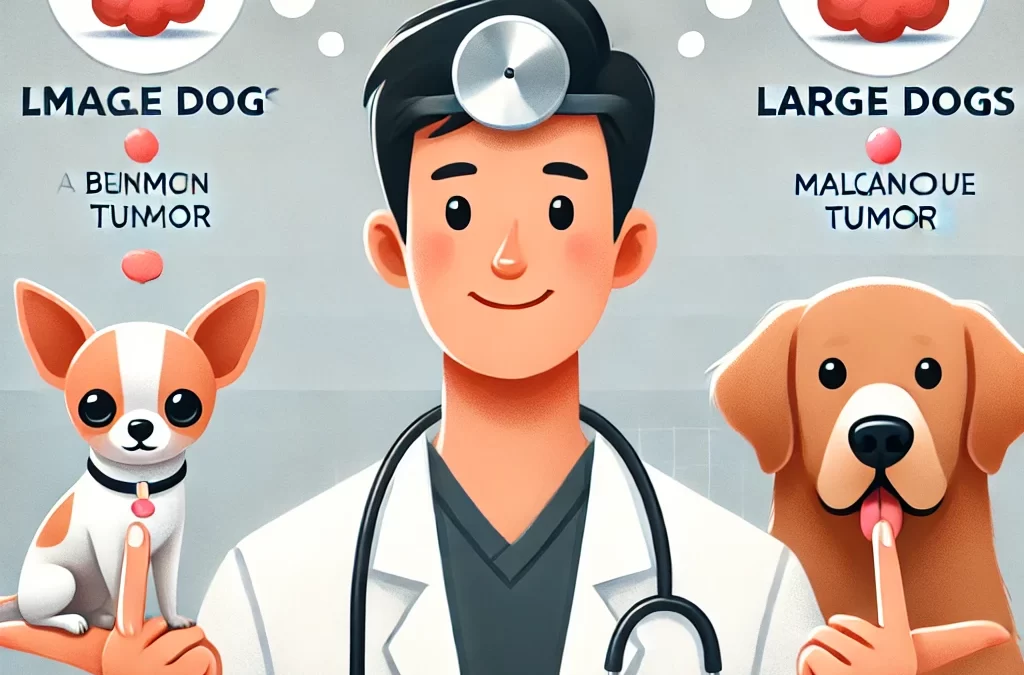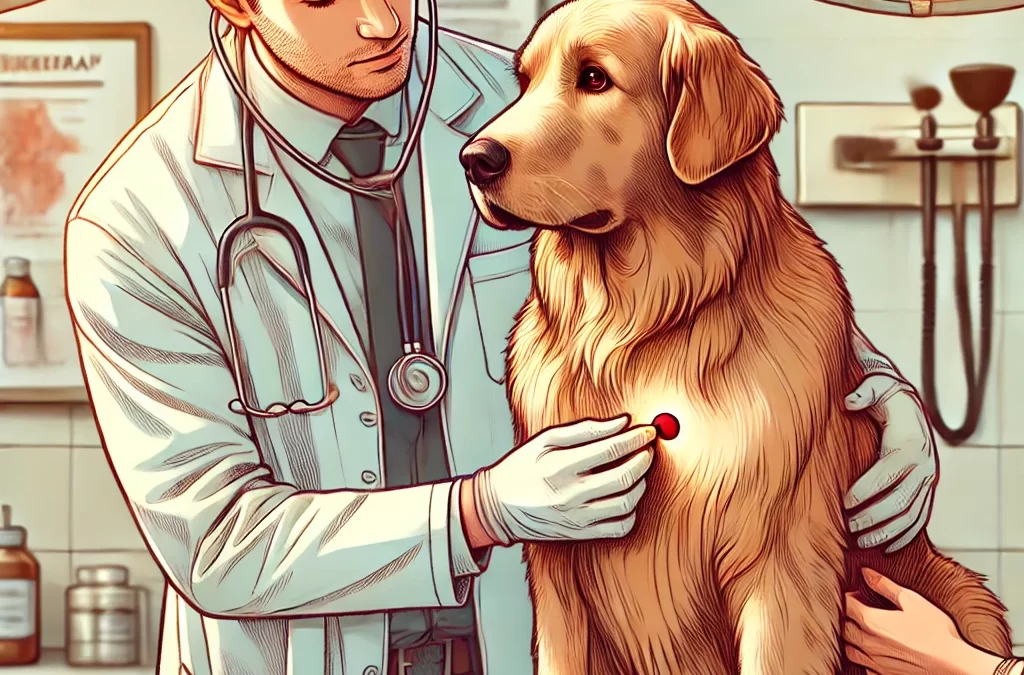
by TCMVET | Jan 21, 2025 | Dog Cancer & Tumors
Watching a beloved dog battle late-stage cancer is an emotional and heart-wrenching journey. While a cure may not be possible, there are ways to enhance their comfort, alleviate pain, and improve their remaining quality of life. This article explores practical, compassionate, and even alternative approaches to supporting dogs with terminal cancer.
1. Prioritizing Pain Management
Pain relief is the cornerstone of late-stage cancer care. Conventional pain management options include:
- Prescription Pain Medications – NSAIDs (non-steroidal anti-inflammatory drugs) and opioids (such as tramadol) help manage pain effectively.
- Adjunct Therapies – Gabapentin for nerve pain and amantadine as an NMDA antagonist can improve comfort when combined with other painkillers.
- CBD Oil and Herbal Remedies – Many pet owners turn to full-spectrum CBD oil, turmeric, and boswellia to help reduce inflammation and pain naturally.
2. Nutritional Support to Strengthen Vitality
A diet tailored for cancer support can slow progression and improve overall well-being. Consider:
- High-Quality Protein – Lean meats and fish provide essential amino acids for muscle maintenance.
- Healthy Fats – Omega-3 fatty acids from fish oil help reduce inflammation and may slow tumor growth.
- Low-Carb, High-Fiber Diet – Cancer cells thrive on sugar, so reducing carbohydrate intake may help slow progression.
- Natural Supplements – Medicinal mushrooms like turkey tail and reishi, along with Chinese herbs like astragalus, can provide immune support.
3. Holistic Therapies for Comfort and Mobility
Beyond medications and diet, holistic treatments can provide additional relief:
- Acupuncture – Helps reduce pain, improve mobility, and stimulate energy balance.
- Massage Therapy – Gentle massage enhances circulation and alleviates stiffness.
- Hydrotherapy – Warm water therapy relieves joint pressure and promotes gentle exercise.
- Energy Healing & Reiki – Some pet owners explore energy healing for relaxation and stress relief.
4. Creating a Comfortable Environment
Adapting your dog’s living space can make a huge difference:
- Soft Bedding & Orthopedic Supports – Memory foam beds reduce pressure sores and joint pain.
- Temperature Control – Older, ailing dogs struggle with temperature regulation, so keeping them warm in winter and cool in summer is essential.
- Minimizing Stress – A quiet, calm environment with familiar scents can help ease anxiety and pain.
5. Managing Digestive Issues & Hydration
Cancer can lead to nausea, diarrhea, and loss of appetite. Addressing these symptoms helps improve well-being:
- Appetite Stimulants – Medications like mirtazapine can encourage eating.
- Homemade Bone Broths – Gentle on the stomach, packed with nutrients, and hydrating.
- Probiotics & Digestive Enzymes – Support gut health and aid digestion.
- Frequent Hydration – Ensuring adequate water intake prevents dehydration and supports kidney function.
6. Emotional Support & Bonding Moments
Your presence is one of the greatest comforts for a dog in their final stages. Spend time together:
- Engage in Favorite Activities – A short walk, a car ride, or a quiet cuddle session can bring joy.
- Talk to Your Dog – The sound of your voice is reassuring and calming.
- Be Present Without Fear – Dogs sense emotions, so maintaining a peaceful and loving energy helps them feel secure.
7. Knowing When to Say Goodbye
One of the hardest decisions is determining when euthanasia is the most compassionate choice. Consider:
- The HHHHHMM Scale – Developed by Dr. Alice Villalobos, this quality-of-life assessment measures Hurt, Hunger, Hydration, Hygiene, Happiness, Mobility, and More Good Days than Bad.
- Veterinary Hospice & At-Home Euthanasia – Many vets offer in-home services to allow a peaceful transition in a familiar environment.
- Listening to Your Dog – Changes in demeanor, persistent pain despite medication, or a complete loss of appetite can indicate it’s time.
Conclusion
Caring for a dog with late-stage cancer is a profound experience filled with love, dedication, and compassion. By focusing on pain management, nutritional support, holistic therapies, and emotional well-being, pet parents can ensure their dog’s remaining days are filled with comfort and dignity. Whether choosing palliative care or eventually making the difficult decision to say goodbye, the goal remains the same: to honor the bond and give them the best quality of life possible.

by TCMVET | Jan 20, 2025 | Dog Cancer & Tumors
When it comes to cancer and tumor development in dogs, size matters—literally. Small and large breeds have different genetic predispositions, metabolic rates, and immune responses, all of which contribute to variations in how tumors develop, progress, and respond to treatment. If you’re a pet parent concerned about your dog’s health, understanding these differences can help you make informed decisions about prevention, early detection, and treatment.
1. The Genetic Factor: Breed-Specific Tumor Risks
Some cancers are more common in certain breeds, and a dog’s size often plays a role in this predisposition.
- Large Breeds: Dogs like Golden Retrievers, Great Danes, and Rottweilers are more likely to develop osteosarcoma (bone cancer), hemangiosarcoma (blood vessel cancer), and lymphoma. These cancers tend to be aggressive and often metastasize quickly.
- Small Breeds: Breeds like Poodles, Dachshunds, and Chihuahuas are more prone to benign tumors such as lipomas and papillomas, but they can also develop mammary tumors and bladder cancer.
The difference is not just in the type of tumors but also in how these cancers behave and respond to treatment.
2. Tumor Growth Rate and Behavior
Tumor progression varies significantly between small and large dogs due to differences in growth rates and cell metabolism.
- Faster Growth in Large Dogs: Larger breeds grow rapidly as puppies, and this rapid cell division may contribute to a higher risk of developing malignant tumors later in life. Their tumors also tend to be more aggressive.
- Slower Growth in Small Dogs: While tumors in small breeds may develop more slowly, they are still a concern. Benign tumors like lipomas are common but may interfere with mobility if they grow too large. Additionally, small dogs can still develop malignant tumors, such as mast cell tumors, which can spread if left untreated.
3. Life Expectancy and Tumor Onset
Large dogs tend to have shorter lifespans than small dogs, and this impacts tumor development timelines.
- Early-Onset Cancers in Large Dogs: Since large breeds age faster, they are more likely to develop cancer at a younger age—often between 6 to 8 years old. This means owners should begin cancer screenings and preventive care early.
- Later-Onset Tumors in Small Dogs: Small breeds may not show signs of cancer until their senior years (10+ years old), which means long-term monitoring is essential.
Understanding these timelines can help pet owners schedule vet checkups at the right time to catch potential tumors early.
4. Diagnosis and Treatment Challenges
When diagnosing and treating tumors, size plays a role in both detection and the ability to perform procedures.
- Surgical Considerations: Large dogs can better tolerate some surgeries due to their larger body mass, but removing tumors in weight-bearing bones (like with osteosarcoma) can be challenging. Small dogs, on the other hand, may struggle with anesthesia risks, especially if they are very tiny.
- Chemotherapy and Medication Differences: Dosing for chemotherapy is weight-dependent, and larger dogs often require higher drug doses, increasing treatment costs. Small dogs, despite needing lower doses, may experience stronger side effects due to their delicate systems.
5. Prevention and Early Detection Strategies
Regardless of size, early detection is crucial. Here’s what dog owners can do:
- Routine Veterinary Checkups: Regular exams help catch tumors before they grow too large.
- Physical Checks at Home: Running your hands over your dog’s body weekly can help detect unusual lumps.
- Breed-Specific Cancer Screenings: Large breeds should have early X-rays and ultrasounds, while small breeds may benefit from skin and bladder screenings.
- Diet and Lifestyle Adjustments: A balanced diet, regular exercise, and weight management can help support overall health and potentially reduce cancer risks.
Final Thoughts
While tumors affect both small and large dogs, their differences in genetics, tumor behavior, and treatment options mean pet owners need tailored care strategies. Large dogs are more prone to aggressive cancers at younger ages, while small dogs may develop slower-growing tumors later in life. By understanding these distinctions and prioritizing early detection, dog owners can improve their pets’ quality of life and potentially extend their time together.

by TCMVET | Jan 20, 2025 | Dog Cancer & Tumors
Picture this: You’ve just given your dog a much-deserved belly rub after a fun-filled walk. Suddenly, your fingertips brush against a small bump you’ve never noticed before. Cue the suspenseful music—Has an alien invader (read: malignant tumor) set up camp, or is it just a harmless squatter (benign growth) chilling under your dog’s skin? Before you sound the alarm or shrug it off, let’s shed some light on how to decode these mysterious new tenants in your furry friend’s body.
1. “Growth CSI”: Forensic Clues That Matter
Think of yourself as the detective in a high-stakes crime drama. Your job is to gather all the evidence:
- Texture and Mobility: Malignant tumors often feel irregular and may adhere to surrounding tissues, while benign lumps tend to be smoother and more mobile.
- Rate of Growth: Is that bump rapidly inflating like a balloon, or has it remained the same size over weeks or months? Faster growth can point to malignancy.
- Associated Symptoms: Changes in appetite, lethargy, weight loss, or localized pain might be extra red flags that require immediate attention.
The key takeaway? Don’t jump to conclusions just from how the lump feels. But do keep your “detective notebook” updated with observations.
2. Scientific Intel: Diagnostic Tests Reveal the Truth
Just like any good thriller, you’ll need a qualified partner to crack the case. In this episode, it’s your trusted veterinarian, armed with high-tech tools and a keen eye for detail:
- Fine Needle Aspiration (FNA): A quick, minimally invasive test that can provide immediate cellular clues. Think of it as collecting “fingerprints” of the lump’s identity.
- Biopsy: Sometimes, a closer look is needed—like analyzing a suspect’s DNA. A biopsy offers a deeper dive into the tissue’s structure and cell behavior.
- Imaging Tools: X-rays, ultrasounds, or MRIs act as the detective’s magnifying glass, spotting hidden clues about the growth’s boundaries and potential spread.
3. Tumor or Benign Growth? Understanding the Verdict
After collecting evidence and running tests, the verdict will be in. Malignant tumors—our “alien invaders”—carry the risk of infiltration and metastasis. This often calls for prompt, sometimes aggressive, treatment, which may include surgery, chemotherapy, or radiation. Benign growths—our “harmless squatters”—generally grow slowly and stay confined, but that doesn’t mean you can always ignore them. Some benign masses can still press on vital organs or become ulcerated over time, necessitating removal or periodic monitoring.
4. Crafting a Treatment Masterplan
Whether the diagnosis is a harmless squatter or a confirmed alien invader, having a solid game plan is non-negotiable:
- Surgical Removal: Often the first line of defense—like evicting a bad tenant.
- Medications & Therapies: Chemotherapy, targeted therapy, or immunotherapy can tip the scales in your dog’s favor if the tumor is malignant.
- Lifestyle Adjustments: From specialized diets to gentle exercise routines, holistic support helps your dog feel their best throughout treatment.
- Ongoing Monitoring: Think of this as your perimeter patrol to ensure no suspicious lumps return or appear elsewhere.
5. Celebrating the Wins and Sharing the Journey
Finding a new lump can be a scary twist in your beloved pet’s story. Yet remember: not every bump is a doom-and-gloom scenario. Armed with vigilance and a proactive approach, you can turn this “alien vs. squatter” mystery into a manageable subplot in your dog’s life adventure. Share updates with your vet, celebrate small victories (a stable lump, successful surgery, good energy levels), and cherish each tail wag along the way.
Because at the end of the day, every detective story worth telling concludes with hope—and maybe a few extra treats for the world’s best sidekick, your dog.

by TCMVET | Jan 18, 2025 | Dog Cancer & Tumors
Cancer in dogs is a formidable challenge, often diagnosed too late for effective intervention. Traditional diagnostic tools such as biopsies and imaging have their limitations—they can be invasive, costly, or incapable of detecting tumors at early stages. Enter tumor biomarkers: molecular signatures found in blood, urine, or tissue that offer a game-changing approach to canine oncology. With advancements in veterinary medicine paralleling breakthroughs in human oncology, the race is on to develop reliable, non-invasive biomarkers for early detection, real-time monitoring, and personalized treatment strategies.
1. What Are Tumor Biomarkers, and Why Do They Matter?
Tumor biomarkers are measurable biological substances that indicate the presence, progression, or response to treatment of cancer. These can be:
- Proteins and Enzymes: Elevated levels of specific proteins, such as C-reactive protein (CRP) or thymidine kinase 1 (TK1), may indicate malignancies.
- Circulating Tumor DNA (ctDNA): Fragments of tumor-derived DNA found in the bloodstream offer insights into genetic mutations and tumor burden.
- Exosomes and MicroRNAs (miRNAs): Tiny extracellular vesicles and non-coding RNAs are emerging as promising tools for cancer detection and prognosis.
The ability to detect cancer before it becomes clinically evident could drastically improve treatment outcomes and quality of life for dogs.
2. The Biomarker Revolution: From Concept to Clinical Application
2.1. Early Detection: The Ultimate Game-Changer
Early-stage cancer is often asymptomatic, making routine screening a challenge. Biomarkers can fill this gap by identifying malignancies long before symptoms appear.
- Canine-Specific CRP and TK1: Elevated levels have been linked to lymphoma, hemangiosarcoma, and mast cell tumors.
- Serum microRNAs: Certain miRNA profiles correlate strongly with osteosarcoma and mammary tumors, paving the way for routine blood tests to detect high-risk cases.
2.2. Prognostic Insights: Predicting Outcomes with Precision
Not all tumors behave the same way. Biomarkers help veterinarians differentiate between aggressive cancers and slow-growing neoplasms, allowing for tailored treatment strategies.
- Ki-67 and PCNA (Proliferation Markers): High expression levels suggest rapid tumor growth and a poorer prognosis.
- LDH (Lactate Dehydrogenase): Elevated LDH levels often indicate metastasis in hemangiosarcoma, guiding treatment intensity.
2.3. Therapeutic Monitoring: Real-Time Treatment Adjustments
Biomarkers allow for non-invasive tracking of tumor response, enabling veterinarians to tweak treatments dynamically.
- Circulating Tumor DNA (ctDNA): Monitoring ctDNA levels can indicate how well a dog is responding to chemotherapy or radiation.
- Exosome Profiling: Changes in exosomal cargo composition post-treatment provide clues about residual disease and relapse risk.
3. Cutting-Edge Technologies Shaping the Future of Canine Oncology
3.1. Artificial Intelligence (AI) Meets Biomarkers
AI-powered diagnostic tools are now being trained to analyze biomarker patterns, offering near-instant, highly accurate assessments. Imagine an AI-driven blood test that predicts cancer risk before clinical signs emerge!
3.2. Liquid Biopsy: The End of Invasive Diagnostics?
Liquid biopsy, which detects ctDNA and exosomal markers, is poised to revolutionize cancer diagnostics. Unlike traditional biopsies, it offers a minimally invasive, real-time snapshot of tumor evolution.
3.3. Personalized Medicine for Dogs
As biomarker research advances, veterinarians may soon have access to biomarker-driven decision-making, selecting the best chemotherapy, immunotherapy, or targeted treatments based on a dog’s unique tumor profile.
4. Challenges and Ethical Considerations
Despite its promise, biomarker-based diagnostics face hurdles:
- Standardization Issues: Biomarker levels can vary due to breed, age, and concurrent diseases.
- Cost vs. Accessibility: Advanced biomarker tests are still expensive and not widely available.
- False Positives and Negatives: No biomarker test is 100% foolproof—further refinement is needed to ensure reliability.
5. Conclusion: The Dawn of a New Era in Canine Cancer Care
Tumor biomarkers are no longer just theoretical tools—they are rapidly becoming integral to canine cancer diagnosis, prognosis, and treatment. By embracing this molecular revolution, veterinary medicine is stepping into a future where cancer is detected earlier, treated more precisely, and monitored with unprecedented accuracy.
As technology evolves, the dream of a simple blood test that screens for multiple canine cancers could soon be a reality, giving dogs and their owners the precious gift of more time and better quality of life.

by TCMVET | Jan 18, 2025 | Dog Cancer & Tumors
The world of veterinary oncology is witnessing a dramatic shift as cutting-edge technology and visionary research converge to transform our approach to canine brain tumors. While conventional diagnostic methods and traditional treatment modalities have long guided practitioners, a new era of innovation promises to redefine clinical outcomes and enhance our understanding of these complex conditions. Below, we explore how state-of-the-art diagnostic tools, artificial intelligence, and the growing influence of stereotactic radiosurgery (SRS) are pushing the boundaries of canine neuro-oncology.
- From Symptoms to Suspicion: The Evolving Diagnostic Landscape
1.1. Recognizing the Unusual
Historically, detecting canine brain tumors hinged on recognizing subtle neurological signs—such as persistent head tilt, ataxia, and changes in behavior or appetite. While these red flags remain crucial, advanced imaging and data analytics are offering a more nuanced perspective. Practitioners are now better able to differentiate between inflammatory conditions, infections, and neoplasms thanks to high-resolution imaging and refined diagnostic algorithms.
1.2. The Rise of Advanced Imaging
• High-Field MRI: Considered the gold standard for visualizing intracranial lesions, high-field MRI provides detailed images of soft tissue and lesion boundaries. The latest MRI sequences, including functional MRI (fMRI) and diffusion tensor imaging (DTI), can delve deeper into tumor biology, revealing microstructural changes before macroscopic abnormalities appear.
• Magnetic Resonance Spectroscopy (MRS): MRS offers molecular-level insights by assessing metabolic changes within the tumor. Elevated choline and lactate peaks, for instance, can serve as early warning signs of malignancy or aggressive growth.
• AI-Assisted Image Analysis: Innovative algorithms driven by artificial intelligence are making it possible to detect and quantify tumor growth with remarkable speed and accuracy. These tools can integrate clinical data, imaging markers, and histopathological findings to predict a tumor’s likely progression or response to treatment.
1.3. Biopsy and Beyond
Though imaging technology has evolved considerably, histopathological confirmation remains a mainstay of definitive diagnosis. Stereotactic biopsy techniques minimize invasiveness, lowering complications and accelerating recovery. In the near future, liquid biopsy—analyzing circulating tumor cells or tumor DNA in the bloodstream—could further reduce the need for invasive procedures, paving the way for real-time tumor monitoring and dynamic treatment adjustments.
- The Quantum Leap: Stereotactic Radiosurgery
2.1. Breaking the Mold of Conventional Radiotherapy
For decades, external beam radiotherapy was the de facto approach to treat inoperable or surgically challenging brain tumors in dogs. While effective in certain cases, it often involved multiple sessions over several weeks. Enter Stereotactic Radiosurgery (SRS)—a precision-driven technique that delivers a concentrated radiation dose to the tumor in one or just a few sessions, minimizing damage to surrounding healthy tissue.
2.2. Hallmarks of SRS
• Pinpoint Precision: Advanced imaging and computerized treatment planning ensure the radiation beam targets only the tumor, sparing surrounding structures.
• Reduced Treatment Sessions: Many canine SRS protocols require fewer visits, thereby reducing stress for both the pet and its owner.
• Rapid Symptom Relief: High-dose radiation frequently shrinks the tumor more quickly, offering faster symptom control compared to traditional fractionated radiotherapy.
• Minimal Side Effects: The focused approach translates to fewer radiation-related complications, such as skin irritation or hair loss.
2.3. Cutting-Edge Equipment
Veterinary hospitals increasingly employ systems once reserved for human medicine, such as Gamma Knife and CyberKnife units. These devices rely on hundreds of convergent radiation beams or a robotic arm capable of delivering high-dose radiation from multiple angles—ensuring unparalleled accuracy and control.
2.4. Integrating SRS with Other Modalities
Stereotactic radiosurgery is no longer an isolated procedure. Many specialists advocate a multimodal approach, combining:
• Chemotherapy or targeted therapy to tackle microscopic disease and distant metastases.
• Immunotherapy to enhance the body’s innate ability to detect and destroy cancer cells.
• Nutritional support and rehabilitation to improve overall well-being, expedite recovery, and maintain muscle mass.
- The Road Ahead: Challenges and Opportunities
3.1. Financial and Logistical Considerations
High-end technology—such as specialized radiotherapy machines—demands significant financial outlay. Consequently, not all veterinary centers can offer SRS, limiting accessibility. However, as technology matures and more clinics adopt advanced equipment, costs may decrease.
3.2. Pushing Research Boundaries
Long-term outcome data and large-scale clinical trials remain relatively scarce in veterinary medicine. By cultivating multidisciplinary collaborations between veterinarians, oncologists, radiologists, and medical physicists, the field can gather robust evidence on the safety, efficacy, and optimal protocols for SRS in dogs.
3.3. Personalized Medicine and Beyond
Molecular profiling, genetic testing, and digital health records are merging to create a more personalized medicine environment in veterinary care. Future innovations might incorporate real-time biomarker tracking to adapt treatment strategies on the fly—potentially revolutionizing canine neuro-oncology in ways we can barely imagine today.
- Conclusion
Diagnosing and treating brain tumors in dogs has never been more sophisticated, nor more hopeful. The fusion of high-precision imaging, AI-driven analytics, and stereotactic radiosurgery is redefining what’s possible in veterinary oncology. While significant challenges remain—from ensuring widespread accessibility to gathering large-scale evidence—the collective momentum points to a brighter future for canine patients with brain tumors.
By embracing these new frontiers, we elevate not only the standard of care in canine neuro-oncology but also the broader mission of veterinary medicine itself: maximizing the health, comfort, and longevity of our beloved companions. As SRS and other groundbreaking therapies gain traction, what once seemed like a distant possibility is rapidly becoming the new norm—offering dogs with brain tumors a truly remarkable second chance at life.

by TCMVET | Jan 17, 2025 | Dog Cancer & Tumors
Discovering that your dog has a tumor can be distressing, and one of the first questions pet owners ask is, “How long does my dog have?” The answer depends on various factors, including the type of tumor, its location, stage, treatment options, and the dog’s overall health. Understanding these elements can help you make informed decisions and provide the best possible care for your furry companion.
Types of Tumors and Their Impact on Life Expectancy
Not all tumors are life-threatening. Some are benign and may not affect your dog’s lifespan, while others are malignant and can spread aggressively.
1. Benign Tumors
Benign tumors, such as lipomas (fatty tumors) and sebaceous adenomas, typically do not impact a dog’s lifespan unless they interfere with movement or organ function. In many cases, dogs can live a normal life without treatment, though surgical removal may be considered for comfort.
2. Malignant Tumors (Cancerous Tumors)
Malignant tumors pose a more serious risk as they can invade surrounding tissues and metastasize to other organs. Common malignant tumors in dogs include:
- Mast Cell Tumors (MCTs): Can be slow-growing or aggressive. With early removal, many dogs continue to live for years, but advanced cases may significantly shorten lifespan.
- Osteosarcoma (Bone Cancer): Highly aggressive, often requiring amputation and chemotherapy. Without treatment, survival time is typically 3–6 months, but with treatment, some dogs live 1–2 years or longer.
- Lymphoma: One of the most common canine cancers. With chemotherapy, remission can extend a dog’s life by 1–2 years, but without treatment, survival time is usually 1–2 months.
- Hemangiosarcoma: A fast-spreading cancer affecting the spleen, heart, or liver. Prognosis is poor, with survival time of a few weeks to months even with treatment.
- Mammary Tumors: If caught early and surgically removed, many dogs recover well. However, malignant cases that have spread significantly reduce life expectancy.
Key Factors Affecting a Dog’s Survival Time
Several variables influence how long a dog with a tumor may live:
1. Early Detection and Diagnosis
The sooner a tumor is identified, the better the chances of effective treatment. Regular veterinary check-ups and monitoring for lumps, weight loss, or behavioral changes can lead to early intervention, which can greatly extend life expectancy.
2. Tumor Type, Location, and Stage
The size, location, and spread of the tumor determine how much it will impact your dog’s health. Tumors affecting vital organs or the nervous system tend to be more dangerous, while skin tumors or those on limbs may be easier to manage.
3. Treatment Options and Response
Treatment significantly affects survival time. Common options include:
- Surgery: Can completely remove benign tumors and some localized cancers, potentially leading to full recovery.
- Chemotherapy: Often used for cancers like lymphoma. While it may not cure cancer, it can extend a dog’s life and improve quality of life.
- Radiation Therapy: Helps shrink tumors that cannot be surgically removed.
- Holistic and Palliative Care: Natural remedies, dietary changes, and pain management can improve comfort and well-being for dogs in advanced stages.
4. Overall Health and Age
A younger dog with a strong immune system is more likely to respond well to treatment compared to an older dog with other underlying health conditions. Maintaining a healthy lifestyle with a balanced diet and exercise can support better outcomes.
5. Quality of Life Considerations
Beyond survival time, a dog’s quality of life is a crucial factor. Monitoring pain levels, appetite, mobility, and energy levels can help determine the best course of action. In some cases, humane euthanasia may be the kindest option if a dog is suffering.
How to Support a Dog with a Tumor
1. Work Closely with a Veterinarian
Regular check-ups, diagnostic tests, and tailored treatment plans can help maximize your dog’s lifespan and comfort.
2. Provide a Nutrient-Rich Diet
A cancer-friendly diet rich in lean proteins, omega-3 fatty acids, and antioxidants can support the immune system and overall health.
3. Manage Pain and Discomfort
Pain management, whether through medication, acupuncture, or herbal supplements, can greatly improve a dog’s well-being.
4. Monitor Changes in Behavior
Noticing signs like increased lethargy, loss of appetite, or difficulty breathing can help you adjust care strategies in a timely manner.
5. Consider Alternative Therapies
Some pet owners explore Traditional Chinese Medicine, CBD oil, or other holistic treatments to support their dog’s health alongside conventional treatments.
Final Thoughts
A tumor diagnosis in dogs does not necessarily mean the end is near. Many dogs live happily for months or even years with proper care, treatment, and lifestyle adjustments. The key is early detection, appropriate treatment, and maintaining a high quality of life. Every dog is different, and by working closely with a veterinarian, you can make the best decisions to ensure your pet’s remaining time is as comfortable and fulfilling as possible.
Would you like to explore more about specific tumor types, treatment options, or holistic care approaches?






